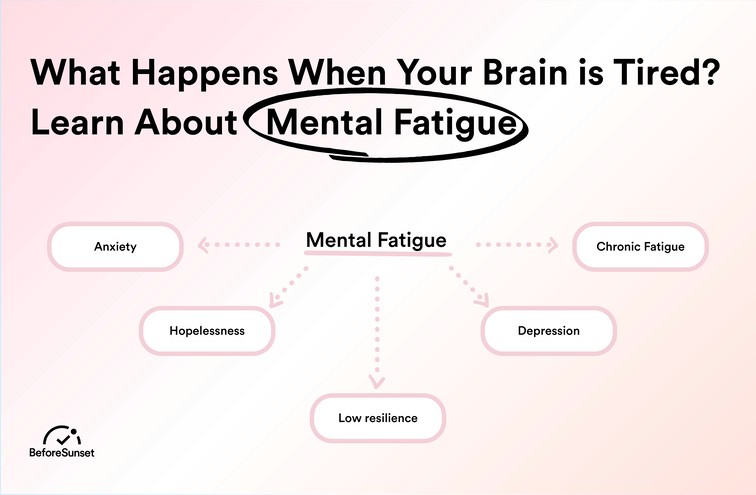Your brain, like your body, may become fatigued. This tiredness is referred to as mental fatigue, also known as cognitive fatigue or brain fatigue. It occurs when the brain is overworked and unable to function at its best. It can show up as trouble concentrating, memory lapses, and a greater likelihood of making mistakes. In this blog we will analyze why this fatigue happens and how to fix it so you can be productive all day every day.
“Sometimes exhaustion is not a result of too much time spent on something, but of knowing that in its place, no time is spent on something else.”
― Joyce Rachelle

Other blogs you might enjoy:
Burnt Out Meaning: Definition of Burned Out, Causes, Symptoms, and Treatment
The Symptoms of Mentally Exhausted: When You Feel Like You Could Sleep For Days
The Complete Dictionary of Unmotivated: Definition, Causes, and How to Get Motivated
What is mental fatigue?
Mental fatigue is a state of heightened mental strain and decreased cognitive performance that can emerge after prolonged mental work. If you have little to no energy, are unable to concentrate, and have a slow response time this might mean you have mental fatigue. Its reasons include a lack of sleep, being unduly stressed, or having a prior medical condition, but it can affect anyone.
Mental vs. emotional exhaustion
Mental and emotional exhaustion are related but distinct concepts.
As previously stated, mental fatigue is a state of increased mental effort and lower cognitive performance caused by lengthy durations of cognitive work. It is a curable and transitory cognitive condition.
Emotional weariness, as opposed to physical depletion, is the incapacity to deal with the emotional demands of a certain situation or role. It is marked by cynicism, alienation from one's surroundings, and a lack of pride in one's own accomplishments, and is frequently associated with extended stress or burnout. Emotional tiredness can have long-term implications if not adequately managed.
In conclusion, when our cognitive brain is overloaded, we experience intellectual tiredness, but emotional exhaustion when our emotional brain is overworked.
What causes mental fatigue?
A multitude of factors can contribute to mental tiredness, including:
Long periods of cognitive activity: Tasks requiring continuous attention and focus, such as studying or working on a complex project, can cause mental tiredness.
Sleep deprivation can cause cognitive impairment and a decreased capacity to focus, resulting in mental tiredness.
Chronic stress can cause mental weariness by interfering with the body's ability to manage stress hormones, resulting in impaired cognitive performance.
Mental weariness can be caused by medical diseases such as depression, anxiety, and thyroid issues.
Medication, as a side effect, several medications, such as antidepressants and stimulants, can cause mental weariness.
Poor nutrition and dehydration also cause mental tiredness because of a lack of calories and fluids.

Symptoms of mental fatigue
Understanding the symptoms of mental fatigue is important in order to be able to identify and manage it effectively but what are those exactly? Learning the symptoms of mental fatigue is the key to solving it that is why we concluded a list of reasons why your brain may be tired.
1. Anxiety
One of the most common signs of mental exhaustion is anxiety. Long periods of cognitive effort and stress can exacerbate anxiety symptoms like concern, anxiousness, and restlessness. Anxiety can also be induced by a lack of sleep, poor diet, and dehydration, all of which can lead to mental exhaustion. Anxiety can also make it harder to focus and pay attention, exacerbating mental exhaustion.
Anxiety, of course, affects our mood and leads to unpleasant feelings and behaviors like irritability, lack of motivation, and indecision. Physical manifestations of stress including muscle tension, headaches, and fatigue can compound the difficulty of dealing with mental fatigue.
If your worries linger, it may be time to consult a doctor because they could be a sign of a more serious problem, like an anxiety disorder.
2. Hopelessness
Hopelessness is a symptom of mental exhaustion that can emerge when an individual is unable to cope with the demands of a circumstance or role. It is a state of despair and helplessness in which there appears to be no way out of a tough or stressful circumstance.
Prolonged periods of mental activity, stress, and lack of sleep can cause mental tiredness, making it more difficult to cope with daily tasks and leading to emotions of pessimism. The individual may feel overwhelmed and unable to see answers to difficulties or a way out of unpleasant situations.
Emotional tiredness and burnout, which are related to mental fatigue, can also lead to emotions of hopelessness. This is related with emotions of cynicism, detachment, and a diminished sense of personal success.
3. Low resilience
A lack of resilience is a hallmark of mental exhaustion, and it manifests itself in a diminished capacity to deal with stress, accept and implement change, and bounce back from adversity. It's a state in which one's resilience to adversity is diminished, making one more susceptible to mental fatigue.
The resilience of an individual can be weakened by prolonged mental effort, stress, and lack of sleep. Because of this, many individuals have a hard time dealing with stress and adjusting to new situations, making them more susceptible to mental fatigue.
Emotional exhaustion and burnout, which are associated with mental fatigue, can also contribute to a lack of resilience. This makes it more challenging to deal with stress and adapt to new situations since it can lead to feelings of cynicism, detachment, and a lessened sense of personal success.

4. Depression
Mental tiredness often manifests as depression. Depression symptoms including melancholy, hopelessness, and loss of interest in activities might worsen during times of high mental activity, stress, and inadequate sleep.
In addition to making it harder to enjoy life or envision a way out of a bleak circumstance, mental weariness can exacerbate the effects of depression. As a result, you can find yourself in a vicious cycle of mental exhaustion and sadness.
Emotional signs of depression, such as anger, low motivation, and difficulty making decisions, can further exacerbate mental weariness.
5. Changes in appetite
Mental fatigue often manifests physically, and changes in appetite are one of its symptoms. The body and mind need rest and rejuvenation to function at their best, thus prolonged mental activity, stress, and lack of sleep can have negative effects on appetite and eating patterns. A decrease of appetite or an increase in appetite are both possible in people with mental tiredness.
Eating less is a common indication of mental exhaustion, which is often accompanied by feelings of anxiety and melancholy. The inability to eat well because of anxiety-induced nausea and stomach pain is common. Depression has been linked to a diminished desire for and enjoyment of food, which can result in a loss of body mass.
Mental weariness can also be caused by, and exacerbated by, inadequate nutrition and dehydration. Those experiencing mental exhaustion may lack the motivation or stamina to cook nutritious meals for themselves.
6. Chronic fatigue
The term "chronic fatigue" is used to describe a mental exhaustion symptom that persists after adequate sleep and rest. It's a problem that might hang around for a while; we're talking months or years.
Mental exhaustion can grow into chronic fatigue if it isn't appropriately managed after lengthy periods of mental exertion, stress, and lack of sleep. This can lower a person's standard of living by making even basic chores challenging.
Mental tiredness is closely related to emotional depletion and burnout, all of which can contribute to chronic fatigue. Cynicism, distancing, and a diminished sense of personal success are the results, which make it more challenging to deal with routine chores and responsibilities.
7. Headaches
Headaches can oftentimes happen because of mental fatigue. How you can recognize them If you are feeling tension on both sides of your head you are most likely experiencing "tension headaches". The reason for that could be too much mental effort, stress, or not getting enough sleep. Stress and mental weariness happens because the muscles in the head, neck, and shoulders tighten.
Migraines are caused by stress, lack of sleep, and mental fatigue. The most typical symptom of a migraine is a headache, but other symptoms include feeling nauseated, vomiting, and being extremely sensitive to light and sound.

How to overcome mental fatigue
Overcoming mental fatigue is important in order to improve cognitive performance, emotional well-being and reduce the risk of burnout. Remember, mental fatigue could happen to anyone but not enough people know how you can solve it. Well that is why you are here, read on to learn the ways to battle mental fatigue.
Eat better
Mind fatigue can be combated in large part by eating healthfully. A healthy diet is essential for optimal brain function and general health. There are many ways in which eating healthily might aid in recovering from mental fatigue.
Nutritionally supporting your body: Fruits, vegetables, whole grains, and lean protein can all help provide the nutrients the body needs to function optimally. Vitamins, minerals, antioxidants, and omega-3 fatty acids can be found in abundance in these foods, all of which are important for brain function.
Stabilizing blood sugar: A diet high in processed carbohydrates and sugar can induce spikes and crashes in blood sugar, leaving you feeling tired and unable to focus. Maintaining consistent energy and stable blood sugar levels throughout the day is possible with a diet high in protein and healthy fats.
Weakness in mental and physical energy caused by dehydration. Staying hydrated and having clear thoughts are both benefits of drinking plenty of water and other fluids.
Keeping away from inflammatory foods: Inflammation in the body can lead to mental fatigue, therefore it's best to avoid processed foods, refined carbohydrates, and sugar. Fruits, vegetables, and omega-3 fatty acids are examples of anti-inflammatory diets that can aid in each of these areas.
Exercise
Physical activity is a tried and true method for reviving a tired mind. Mental health, vitality, and stress levels can all benefit from a consistent exercise routine.
Improved cognitive performance and less mental tiredness are two benefits of exercise's effect on blood flow to the brain.
Endorphins, "feel-good" chemicals released during exercise, have been shown to boost mood and alleviate tension and anxiety. This has the potential to lessen mental weariness and boost health on all fronts.
Exercising can help you get a better night's rest, which in turn can help you feel less mentally drained in the morning.
Stress reduction: Physical activity has been linked to reduced levels of the stress hormone cortisol, suggesting a positive feedback loop between the two. This has the potential to increase motivation and lessen mental weariness.
Prioritize sleep
To combat mental exhaustion, it is crucial to give sleep a higher priority. Sleep is necessary for optimal mental, emotional, and physical wellbeing. Lack of sleep can cause mental weariness, manifesting itself in a lack of energy, inability to focus, and slower reaction times.
Creating and adhering to a regular sleep routine is crucial if you want to give sleep the priority it deserves. In other words, maintain a regular sleep-wake schedule even on the weekends. The bedroom should be kept dark, quiet, and cold; electronic gadgets should be avoided at least an hour before night; and exercise should be done in the morning.

Take breaks
It is critical to take frequent breaks to avoid mental weariness. Long periods of mental labor can exhaust the brain, causing performance to decrease. Taking short breaks at regular intervals has been found to boost productivity by reviving mental energy, reducing weariness, and reducing stress.
The Pomodoro Technique, in which one works for 25 minutes before taking a 5-minute break, is one productive approach of taking pauses. As a result, you'll have more mental energy and concentration, and you'll be less likely to burn out.
It's also a good idea to take breaks that get you out of the office. Going for a stroll, stretching, or indulging in an activity unrelated to work, such as reading, listening to music, or meditating, are instances of this. This has the potential to reduce stress, lift spirits, and energize the mind.
Mental Model and Mental Fatigue
A mental model refers to an individual's internal representation or understanding of how something works or how different elements relate to each other within a particular domain. It is a cognitive framework that helps people make sense of and interpret the world around them. Mental models can be influenced by personal experiences, knowledge, beliefs, and cultural factors.
Mental fatigue, on the other hand, is a state of exhaustion or weariness that affects cognitive processes and mental functioning. It typically arises from prolonged periods of intense mental activity, such as studying for long hours, engaging in complex problem-solving tasks, or working on mentally demanding projects. Mental fatigue can impair concentration, memory, decision-making, and overall cognitive performance. Symptoms may include reduced motivation, increased distractibility, decreased alertness, and a feeling of mental "fogginess."
